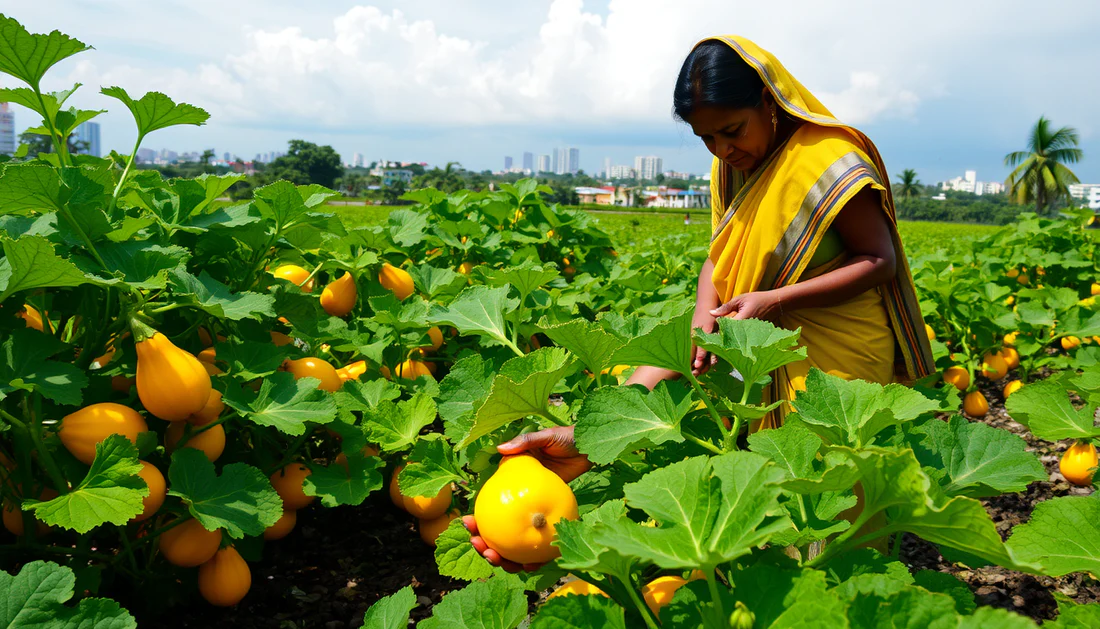
Cultivating Squash: A Bountiful Harvest in Bangalore's Climate
Share
As the sun rises over the bustling city of Bangalore, gardeners and urban farmers alike are turning their attention to the humble yet versatile squash. In this vibrant metropolis, where the climate can be both challenging and rewarding, growing squash has become a popular pursuit, offering a bountiful harvest and a connection to the natural world.
Unlocking the Secrets of Squash Cultivation
Bangalore's unique climate, with its moderate temperatures and reliable rainfall, presents both opportunities and obstacles for squash growers. Understanding the specific needs of this versatile vegetable is the key to unlocking a successful harvest.
Choosing the Right Variety
The first step in growing squash in Bangalore is selecting the right variety. While there are numerous types of squash, some perform better in the city's climate than others. Zucchini, yellow squash, and pumpkin are all excellent choices, as they thrive in the warm, humid conditions.
Preparing the Soil
Squash plants require well-draining, nutrient-rich soil to reach their full potential. In Bangalore, the soil can often be heavy and clay-like, necessitating some preparation. Incorporating organic matter, such as compost or aged manure, can improve soil structure and fertility, providing the ideal foundation for your squash plants.
Timing the Planting
Timing is crucial when it comes to growing squash in Bangalore. The best time to plant is typically during the cooler months, between October and February, when temperatures are more moderate and the risk of pests and diseases is lower.
Nurturing Your Squash Plants
Once your squash plants are in the ground, it's time to focus on their ongoing care and maintenance. From watering to pest management, each step plays a vital role in ensuring a bountiful harvest.
Watering Wisely
Squash plants are thirsty, requiring consistent moisture to thrive. In Bangalore's climate, it's important to water your plants regularly, ensuring the soil remains moist but not waterlogged. Drip irrigation or soaker hoses can be particularly effective in delivering water directly to the root zone.
Feeding for Robust Growth
Squash plants are heavy feeders, requiring a steady supply of nutrients to produce an abundant crop. Organic fertilizers, such as compost or well-rotted manure, can provide a slow-release source of essential nutrients, supporting the plants' growth and development.
Controlling Pests and Diseases
Bangalore's warm, humid climate can create the perfect breeding ground for a variety of pests and diseases that can threaten your squash plants. Vigilant monitoring and proactive measures, such as using organic pest control methods and practicing good sanitation, are crucial for maintaining a healthy, thriving garden.
Harvesting and Enjoying the Bounty
As the months pass and your squash plants mature, the anticipation of a bountiful harvest builds. Knowing when to harvest and how to properly store your squash can ensure you make the most of your hard work.
Timing the Harvest
Squash is typically ready for harvest when the skin is firm and the fruit has reached its desired size. In Bangalore, this can vary depending on the variety, but generally, you can expect to harvest your squash within 50-80 days of planting.
Preserving the Harvest
Once you've harvested your squash, it's important to properly store and preserve your bounty. Squash can be enjoyed fresh, canned, or frozen, allowing you to savor the flavors of your homegrown produce long after the growing season has ended.
Embracing the Joy of Squash Cultivation
Growing squash in Bangalore's climate is a rewarding and fulfilling pursuit, offering gardeners a chance to connect with nature, enjoy the fruits of their labor, and contribute to a more sustainable, self-sufficient urban landscape. By mastering the art of squash cultivation, you can not only nourish your body but also your soul, as you witness the transformation of a humble seed into a bountiful harvest.
